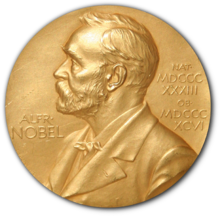Nobel Prize in physics
| The Nobel Prize in Physics | |
|---|---|
 |
|
| Awarded for | Outstanding contributions for mankind in physics |
| Date | December 10, 1901 |
| Location | , Sweden |
| Presented by | Royal Swedish Academy of Sciences |
| Reward(s) | 8 million SEK |
| First awarded | 1901 |
| Most awards | John Bardeen (2) |
| Official website | nobelprize.org |
|
|||||||||||||
|
|||||||||||||
|
"for theoretical discoveries of topological phase transitions and topological phases of matter" |
|||||||||||||
|
|||||||||||||
Takaaki Kajita
Arthur B. McDonald
(2015)
David J. Thouless
Duncan Haldane
J. Michael Kosterlitz
(2016)
The Nobel Prize in Physics (Swedish: Nobelpriset i fysik) is a yearly award given by the Royal Swedish Academy of Sciences for those who conferred the most outstanding contributions for mankind in the field of physics. It is one of the five Nobel Prizes established by the will of Alfred Nobel in 1895 and awarded since 1901; the others being the Nobel Prize in Chemistry, Nobel Prize in Literature, Nobel Peace Prize, and Nobel Prize in Physiology or Medicine.
The first Nobel Prize in Physics was awarded to German/Dutch physicist Wilhelm Röntgen in recognition of the extraordinary services he has rendered by the discovery of the remarkable rays (or x-rays). This award is administered by the Nobel Foundation and widely regarded as the most prestigious award that a scientist can receive in physics. It is presented in at an annual ceremony on December 10, the anniversary of Nobel's death. Through 2016, a total of 203 individuals have been awarded the prize.
Only two women have won the Nobel Prize in Physics: Maria Goeppert Mayer in 1963 and Marie Curie in 1903.
Alfred Nobel, in his last will and testament, stated that his wealth be used to create a series of prizes for those who confer the "greatest benefit on mankind" in the fields of physics, chemistry, peace, physiology or medicine, and literature. Though Nobel wrote several wills during his lifetime, the last one was written a year before he died and was signed at the Swedish-Norwegian Club in Paris on 27 November 1895. Nobel bequeathed 94% of his total assets, 31 million Swedish kronor (US$198 million, Euro€176 million in 2016), to establish and endow the five Nobel Prizes. Due to the level of skepticism surrounding the will, it was not until April 26, 1897 that it was approved by the Storting (Norwegian Parliament). The executors of his will were Ragnar Sohlman and Rudolf Lilljequist, who formed the Nobel Foundation to take care of Nobel's fortune and organise the prizes.
...
Wikipedia



